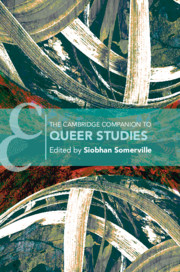Book contents
- The Cambridge Companion to Queer Studies
- The Cambridge Companion to Queer Studies
- Copyright page
- Dedication
- Contents
- Figures
- Contributors
- Acknowledgments
- Chronology
- Introduction
- Part I Genealogies
- Part II Confluences
- Part III Representation
- Part IV Key Words
- Chapter 13 Queer Diasporic Crossings and the Persistence of Desire in The Book of Salt
- Chapter 14 Diaspora, Displacement, and Belonging
- Chapter 15 Queer Critical Regionalism
- Index
- Cambridge Companions to …
- References
Chapter 13 - Queer Diasporic Crossings and the Persistence of Desire in The Book of Salt
from Part IV - Key Words
Published online by Cambridge University Press: 02 June 2020
- The Cambridge Companion to Queer Studies
- The Cambridge Companion to Queer Studies
- Copyright page
- Dedication
- Contents
- Figures
- Contributors
- Acknowledgments
- Chronology
- Introduction
- Part I Genealogies
- Part II Confluences
- Part III Representation
- Part IV Key Words
- Chapter 13 Queer Diasporic Crossings and the Persistence of Desire in The Book of Salt
- Chapter 14 Diaspora, Displacement, and Belonging
- Chapter 15 Queer Critical Regionalism
- Index
- Cambridge Companions to …
- References
Summary
This chapter reflects on theorizations of “queer diasporas” through an analysis of Monique Truong’s novel The Book of Salt (2003). A crucial, though not uncontested, concept, “queer diaspora” investigates the global circulations and alterations of “queer” practices, identities, and economies as well as the incommensurate meanings and valuations of nonnormative gender-sexual formations across disparate geopolitical locations. The Book of Salt illustrates and complicates these precepts by rewriting the story of expatriate modernism in Paris from the perspective of a queer, exiled, Vietnamese cook employed in Gertrude Stein and Alice B. Toklas’s salon. The novel’s portrayals of queer diasporic crossings in Saigon and Paris refuse presumptions of queer commonality across social hierarchies as well as teleological narratives of gender-sexual liberation in the move from colony to metropole, while insisting on the narrator’s persistent pursuit of his queer desires in the face of repeated betrayal and nonreciprocity. It thus becomes the reader’s ethical obligation to respond sympathetically to the narrator’s temporally impossible call and recognize his subjective account.
Keywords
- Type
- Chapter
- Information
- The Cambridge Companion to Queer Studies , pp. 201 - 214Publisher: Cambridge University PressPrint publication year: 2020

